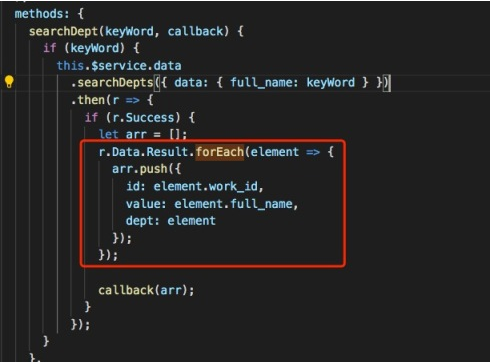Vue必学知识点之forEach()的使用
前言
在前端开发中,经常会遇到一些通过遍历循环来获取想要的内容的情形,而且这种情形在开发中无所不在,那么本篇博文就来分享一个比较常用又经典的知识点:forEach() 的使用。
forEach() 是前端开发中操作数组的一种方法,主要功能是遍历数组,其实就是 for 循环的升级版,该语句需要有一个回调函数作为参数。回调函数的形参依次为:1、value:遍历数组的内容;2、index:对应数组的索引,3、array:数组自身。
在 Vue 项目中,标签里的循环使用 v-for,方法里面的循环使用 forEach。
一、forEach() 使用原理
forEach() 方法主要是用于调用数组的每个元素,并将元素传递给回调函数。需要注意的是: forEach() 方法对于空数组是不会执行回调函数的。
forEach:即 Array.prototype.forEach,只有数组才有的方法,相当于 for 循环遍历数组。用法:arr.forEach(function(item,index,array){...}),其中回调函数有 3 个参数,item 为当前遍历到的元素,index 为当前遍历到的元素下标,array 为数组本身。forEach 方法不会跳过 null 和 undefined 元素。比如数组[1,undefine,null,,2]中的四个元素都将被遍历到,注意与 map 的区别。
二、forEach() 语法
array.forEach(function(currentValue, index, array), thisValue)
例子:
array.forEach(function(item,index,array){ ... })
三、forEach() 其他相关内容
1、forEach()的 continue 和 break:
forEach() 自身不支持 continue 和 break 语句的,但是可以通过 some 和 every 来实现。
2、forEach()与 map 的区别:
forEach()没有返回值,性质上等同于 for 循环,对每一项都执行 function 函数。即 map 是返回一个新数组,原数组不变,而 forEach 是改变原数组。
3、forEach()与 for 循环的对比:
for 循环步骤多比较复杂,forEach 循环比较简单好用,不易出错。
4、forEach()例子:
实例一:
let array = [1, 2, 3, 4, 5, 6, 7];
array.forEach(function (item, index) {
console.log(item); //输出数组的每一个元素
});
实例二:
var array=[1, 2, 3, 4, 5];
array.forEach(function(item, index, array){
array[index]=4 * item;
});
console.log(array); //输出结果:修改了原数组元素,为每个元素都乘以4
实例三:
<el-checkbox v-for="(item) in searchContent"
:label="item.id"
:key="item.id"
class="checkbox">
<span>{{item.value}}{{item.checked}}</span>
</el-checkbox>
handle(index, row) {
this.selectedCheck=[];
let a = this;
this.jurisdiction = true;
this.roleId = row.id;
this.$http.get(“/user/resources", {
params: {userId: this.userId}
}).then((response) => {
a.searchContent = response.body;
a.searchContent.forEach(function (b) {
if(b[‘checked']){
a.selectedCheck.push(b.id);
}
})
})
实例四:
var userList = new Array();
var data = {};
if (response.data.userList != null && response.data.userList.length > 0) {
response.data.userList.forEach((item, index) => {
data.a = item.a;
data.b = item.b;
data.arr1 = new Array();
data.arr1[0] = item.c;
data.arr1[1] = item.d;
data.e = item.e;
data.f = item.f;
data.arr2 = new Array();
data.arr2[0] = item.j;
data.arr2[1] = item.h;
userList.push(data);
});
}
实例五:
searchDept(keyWord, callback) {
if (keyWord) {
this.$service.data
.searchDepts({ data: { full_name: keyWord } })
.then(r => {
if (r.Success) {
let arr = [];
r.Data.Result.forEach(element => {
arr.push({
id: element.work_id,
value: element.full_name,
dept: element
});
});
callback(arr);
}
});
}
},

总结
到此这篇关于Vue必学知识点之forEach()使用的文章就介绍到这了,更多相关Vue forEach()使用内容请搜索脚本之家以前的文章或继续浏览下面的相关文章希望大家以后多多支持脚本之家!
相关文章

Vue向后台传数组数据,springboot接收vue传的数组数据实例
这篇文章主要介绍了Vue向后台传数组数据,springboot接收vue传的数组数据实例,具有很好的参考价值,希望对大家有所帮助。一起跟随小编过来看看吧2020-11-11












最新评论